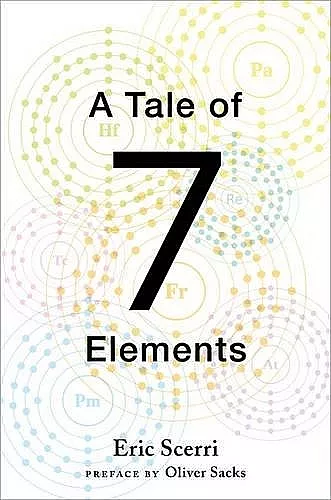A Tale of Seven Elements
Format:Hardback
Publisher:Oxford University Press Inc
Published:18th Jul '13
Currently unavailable, and unfortunately no date known when it will be back

In 1913, English physicist Henry Moseley established an elegant method for 'counting' the elements. Soon afterwards, it became clear that there were precisely seven elements missing from the periodic table--those that had yet to be isolated among the 92 naturally occurring elements from hydrogen (#1) to uranium (#92). In A Tale of Seven Elements, Eric Scerri will present the discovery of those seven elements, five of which are radioactive and three or possibly four of were first isolated by women. The book covers a period roughly spanning the two world wars, beginning with the discovery of protactinium in 1917 and ending with that of promethium in 1945. In some cases, the state of war directly influenced attempts to isolate some of the seven elements--this is true of protactinium, when, in 1916, its discoverer, Lise Meitner, wrote of the problems she encountered in purchasing even the most basic items of laboratory equipment. During the second war, the discovery of nuclear fission, also by Meitner and her associates, quickly led to the development of the nuclear weapons program and the associated technologies of particle accelerators. Clearly, scientific discoveries occur within a social and political context and the discovery of the seven elements is no exception. This book draws together for the first time the fascinating stories of the discoveries of these seven elements, placing them in historical context.
A Tale of Seven Scientists is a well-written, provocative and stimulating book, a bold attempt to base an evolutionary view of science on fragments of the modern history of chemistry and physics. * Helge Kragh, Bulletin for the History of Chemistry *
it is an excellent read, and it is warmly recommended to all students and practitioners of chemistry and related fields, and to all those who are interested in the history and the culture of science. * Istvan Hargittai, Journal of Structural Chemistry *
Eric Scerri offers us a fascinating account of the discovery of these seven elements. Author of The Periodic Table: Its Story and Its Significance (2007), Scerri is superbly qualified for this task: chemist, philosopher of science and historian, he is the foremost contemporary analyst of the periodic table. * Alan Rocke, THE *
As a professional historian of chemistry who thought that he already knew these stories, I was surprised by how much novel and interesting material Scerri has unearthed in this admirable book. He offers corrections to many long-standing textbook errors, both historical and scientific, and presents a fresh, thoroughly researched understanding of a complex web of interacting research during a period of about 30 years... chemists, historians and philosophers of science, as well as educated laypeople, will unquestionably find this book an entertaining and highly instructive read. * Alan Rocke, THE *
fascinating stories, full of priority disputes, nationalistic squabbles, firm announcements of non-existent elements, and flashes of comedy and tragedy. * Virginia Trimble, The Observatory *
It's an extraordinary rich and complete book, not only regarding the chemistry of each of the studied elements, but also on the nature of science [translation] * Revista Eureka sobre Ensenanza y Divulgacion de las Ciencias *
You could say the periodic table is elementary, but Eric Scerri shows that the stories behind the key discoveries in chemistry were dramatic, political and full of blind alleys. * New Scientist *
compulsory reading for those who wish to inject some life into the story of the elements and the periodic table. * Kevin de Berg, Science and Education *
ISBN: 9780195391312
Dimensions: 145mm x 211mm x 31mm
Weight: 431g
304 pages